As a Vietnamese, I always see my foreign friends’ eyes widen when they discover just how many Banh Mi types exist in Vietnam.
Here, Banh Mi isn’t just a dish—it’s a whole culture. So I decided to make a full guide for fellow Banh Mi lovers.
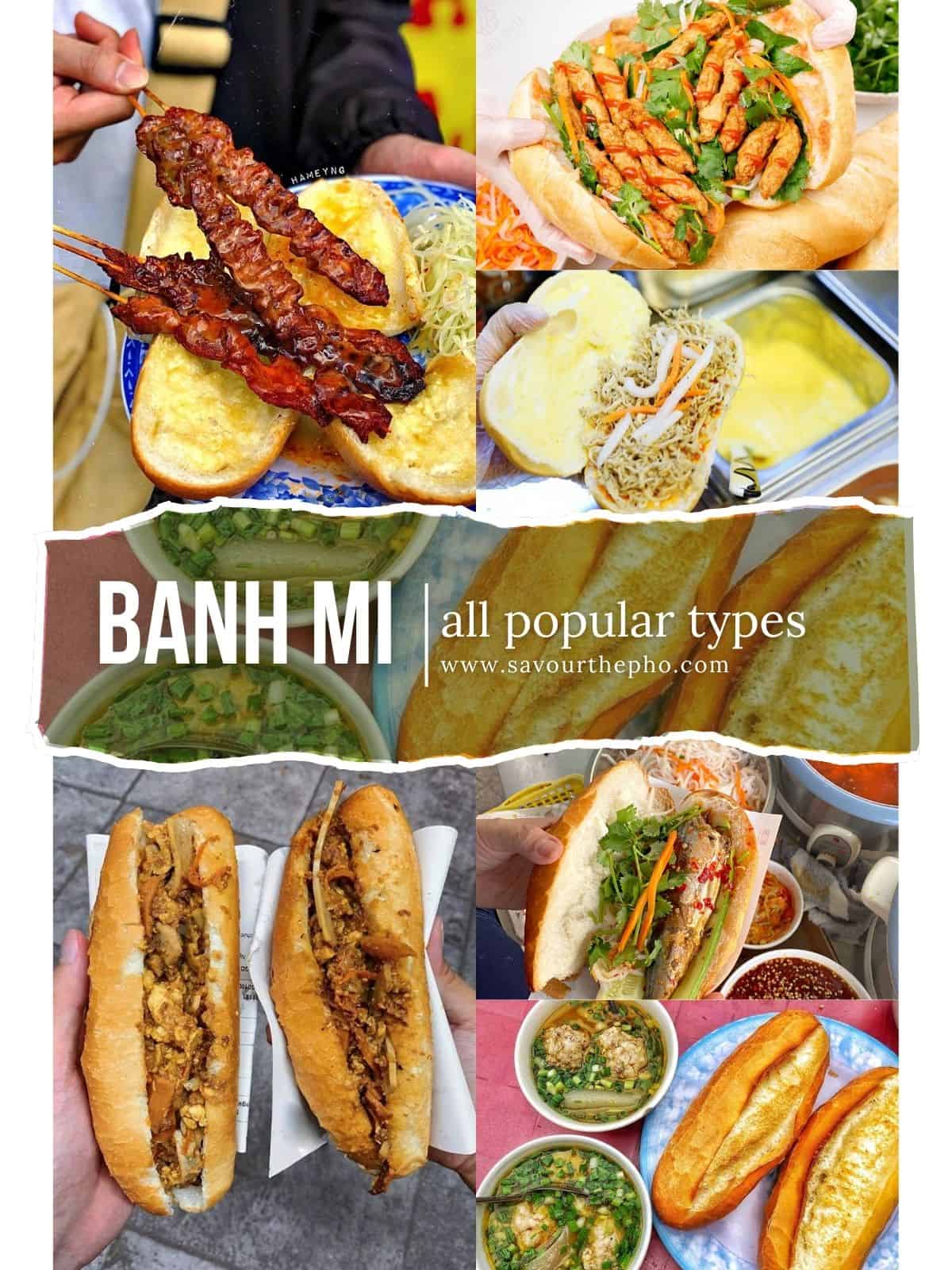
What’s Inside
- What is exactly Bánh Mì?
- 1. Bánh Mì Không (Plain Banh Mi)
- 2. Bánh Mì Thịt Nguội (Cold Cut Banh Mi)
- 3. Bánh Mì Ốp La (Fried Egg Banh Mi)
- 4. Bánh Mì Heo Quay (Crispy Pork Belly Banh Mi)
- 5. Bánh Mì Thịt Nướng (Grilled Pork Banh Mi)
- 6. Bánh Mì Xíu Mại (Meatball Banh Mi)
- 7. Bánh Mì Gà (Chicken Banh Mi)
- 8. Bánh Mì Bì (Shredded Pork Skin Banh Mi)
- 9. Bánh Mì Bò Nướng (Grilled Beef Banh Mi)
- 10. Bánh Mì Thịt Xíu (Five-Spice Pork Banh Mi)
- 11. Bánh Mì Cá Mòi (Sardine Banh Mi)
- 12. Bánh Mì Chả Cá (Fish Cake Banh Mi)
- 13. Bánh Mì Dân Tổ (Racing Boy Banh Mi)
- 14. Bánh Mì Chay (Vegetarian Banh Mi)
- 15. Bánh Mì and Beyond
What is exactly Bánh Mì?
In Vietnam, Banh Mi simply means bread—any kind of bread: baguette, loaf, bun, or roll. Abroad, though, most people think of it as the sandwich. Honestly, saying “Banh Mi Sandwich” is a bit redundant—kind of like “Chai Tea” or “Naan Bread.”
As bread, there are tons of types: Bánh Mì Xúc Xích (Chinese hot dog buns), Bánh Mì Bơ Tỏi Phô Mai (Korean-style cream cheese garlic buns), or even loaf-style breads like Shokupan.
And even as the sandwich most people know, there are still dozens of variations.

In Vietnam, a quick breakfast often means a Banh Mi sandwich with a Vietnamese iced coffee, though many still enjoy taking their time with Bun Bo Hue, Pho or Mi Quang.
Today, I’ll focus only on the sandwich—the part most people are curious about.
1. Bánh Mì Không (Plain Banh Mi)
In Vietnam, a plain Vietnamese baguette is simply called Bánh Mì, or more specifically, Bánh Mì Không—literally, Bánh Mì with nothing inside.
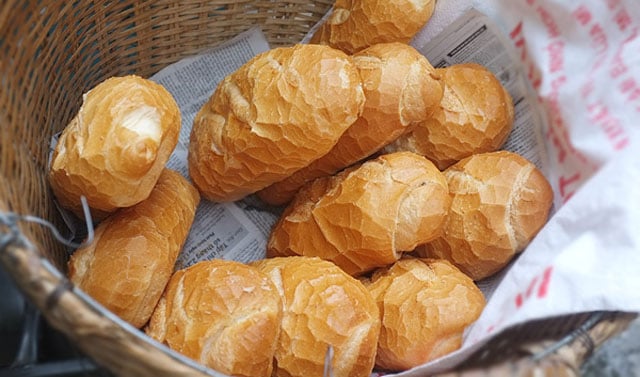
For Vietnamese kids, nothing beats a warm, crispy baguette dipped in sweetened condensed milk or smeared with Laughing Cow cheese and a sprinkle of sugar. Pure nostalgia.
And a plain baguette is so versatile—you can enjoy it with anything, from Ube Halaya (purple yam jam) to Kaya (coconut jam), or pair it with classic main dishes like Bo Kho (beef stew), Ca Ri Ga (chicken curry), or Bo Ne (steak & eggs).
2. Bánh Mì Thịt Nguội (Cold Cut Banh Mi)
If there’s one Bánh Mì that put Vietnam on the world map, it’s Bánh Mì Thịt Nguội—the cold cut Bánh Mì.
In Saigon, famous spots like Bánh Mì Huynh Hoa take it to another level with generous spreads of homemade liver pâté, house mayo, and a variety of Vietnamese-style cold cuts.

You can even turn it into a Banh Mi charcuterie board—perfect for parties or casual get-togethers.
Making it at home is easier than you think, especially if you have access to a Vietnamese market. Besides a crispy baguette, you’ll need:
Cha Lua (pork roll) and Gio Thu (headcheese)
Vietnamese pickled veggies (Đồ Chua)
Pork floss
Maggi seasoning
Chili slices, cilantro, and matchstick cucumbers
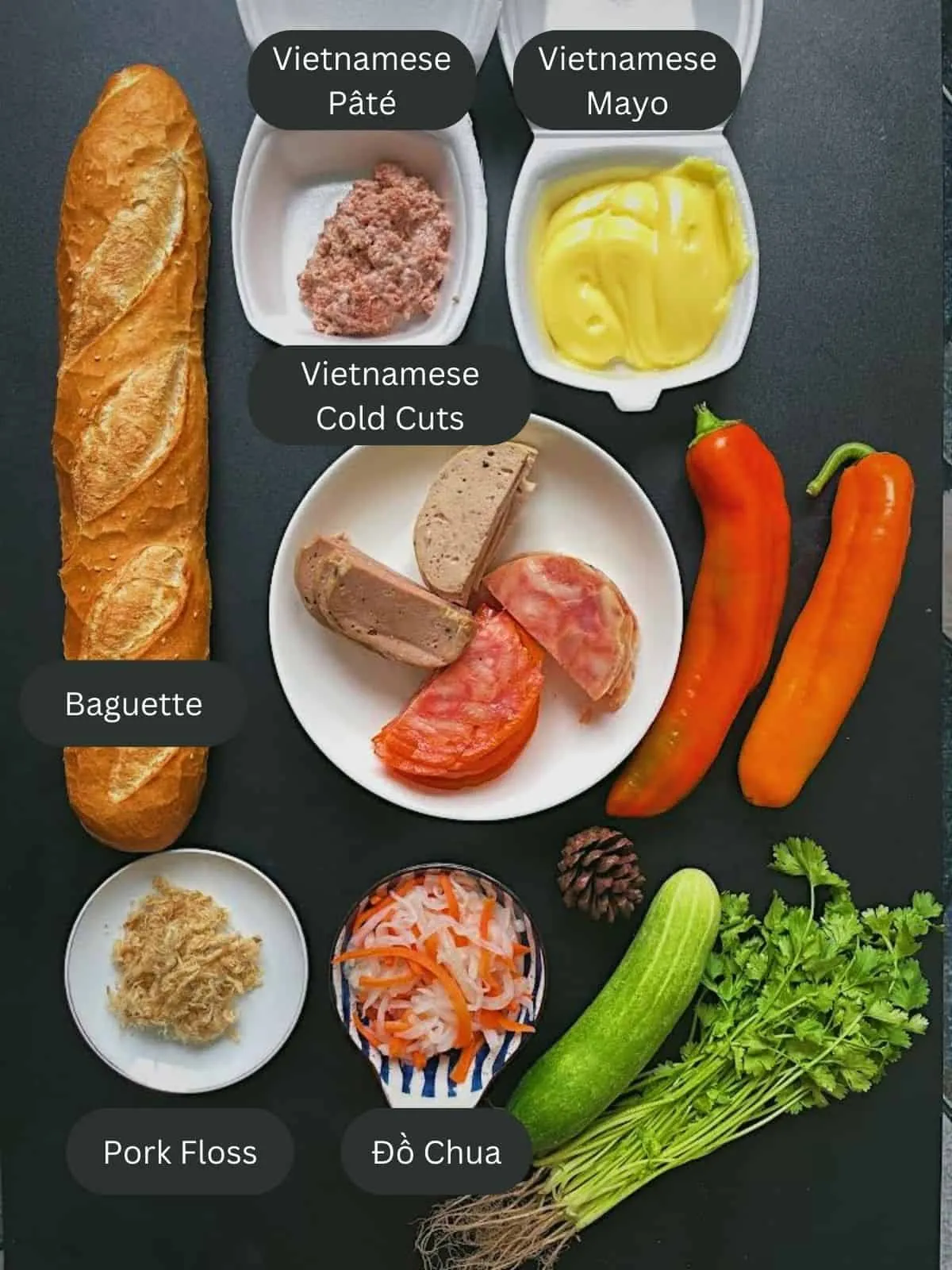
3. Bánh Mì Ốp La (Fried Egg Banh Mi)
Bánh Mì Ốp La literally means Bánh Mì with Ốp La—“Ốp La” is the Vietnamese take on the French oeuf au plat.

Ốp La is a sunny-side-up style fried egg with crispy edges and a runny yolk, while Ốp Lết refers to a Vietnamese omelette with egg and ground pork.
This is probably the easiest Banh Mi to make at home: just a baguette, fried eggs, a few fresh herbs, some chili sauce, and a dash of Maggi.
The fancier version in Vietnam is served in a small two-handled pan with extra toppings like sausages, Laughing Cow cheese, fried fish cake, and the baguette is used to scoop up everything. Think of Saigon’s famous Bánh Mì Hòa Mã.
4. Bánh Mì Heo Quay (Crispy Pork Belly Banh Mi)
Not every Bánh Mì in Vietnam comes with liver pâté or house mayo—and Pork Belly Banh Mi is one of those exceptions.
Crispy roast pork belly with that golden crackling skin and tender, juicy layers of meat tucked inside a warm baguette — paired with pickled carrots, daikon, cilantro, and a drizzle of Maggi or a splash of Nuoc Cham.

5. Bánh Mì Thịt Nướng (Grilled Pork Banh Mi)
Bánh Mì Thịt Nướng is for those who love a smoky, caramelized flavor.
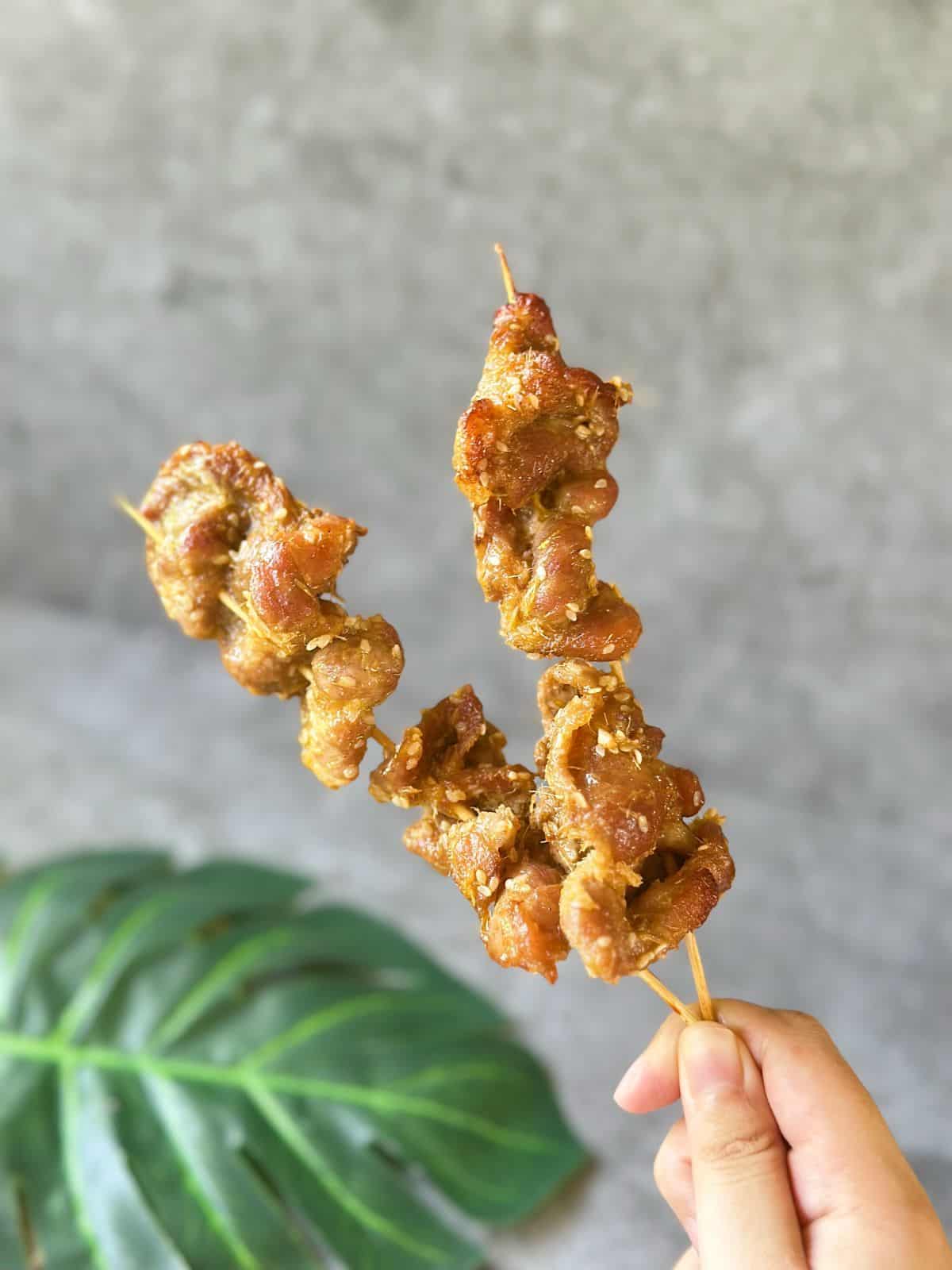
Thin slices of Thit Nuong (grilled pork), often marinated in lemongrass, garlic, and sugar, are stuffed into a baguette with pickled vegetables, fresh herbs, and chili sauce.
You’ll fall in love with this grilled pork Banh Mi right away if you’re already a fan of Bun Thit Nuong, Bun Cha, or lemongrass pork chops.
6. Bánh Mì Xíu Mại (Meatball Banh Mi)
Xíu mại are Vietnamese-style meatballs—soft, juicy, and full of flavor.
There are actually two kinds you’ll find in Vietnam: one simmered in a rich tomato sauce, and another Đà Lạt style, without tomato but just as comforting.
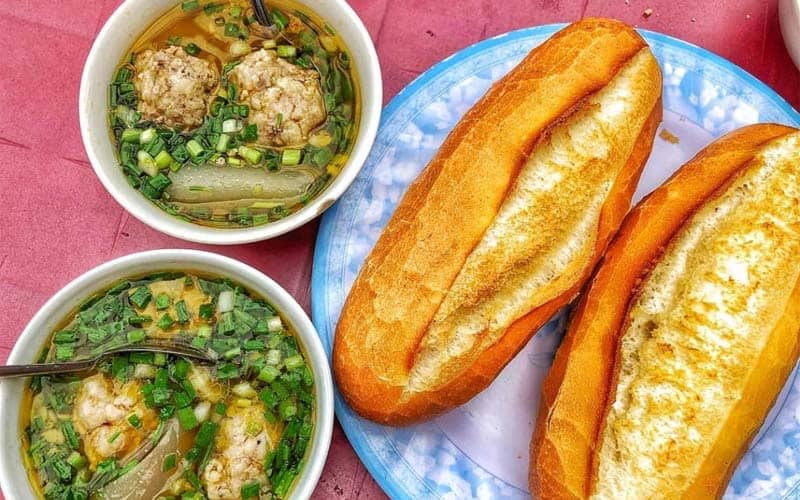
You can tuck the xíu mại inside a baguette or simply spoon it over and scoop with pieces of bread like we often do at street stalls. It’s warm, saucy, and satisfying—especially on a cool morning in the highlands.
7. Bánh Mì Gà (Chicken Banh Mi)
In Vietnam, Chicken Banh Mi usually comes with shredded chicken—simple, light, and full of flavor.
The chicken’s often just mixed with a bit of seasoning and honey mayo, then layered with pickled carrots, daikon, herbs, and chili.
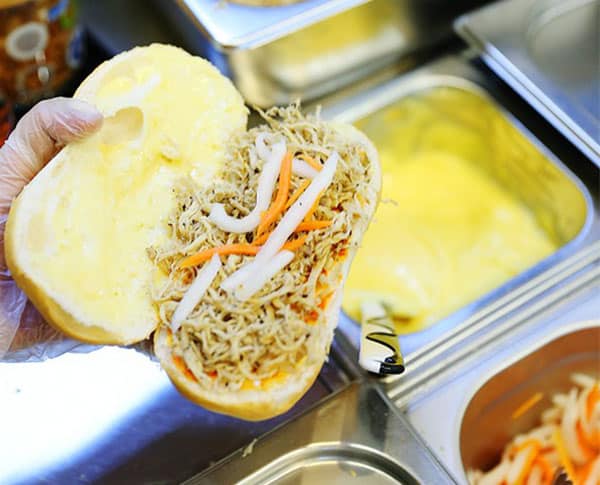
This sandwich actually started in Saigon before the end of the Vietnam War. I like it because it feels a bit “cleaner” than the ones packed with pâté or cold cuts.
Outside Vietnam, you’ll often see the grilled lemongrass chicken version—juicy, fragrant, and just as satisfying in its own way.
8. Bánh Mì Bì (Shredded Pork Skin Banh Mi)
A Southern specialty! if you’re a fan of Cơm Tấm (broken rice platter), you’ll fall for this instantly.
Bì (Shredded pork and pork skin) tossed with roasted rice powder for that nutty aroma, then layered with Đồ Chua, scallion oil, cucumber, herbs, and chili. Light, fragrant, and a bit chewy—definitely a fun texture experience.
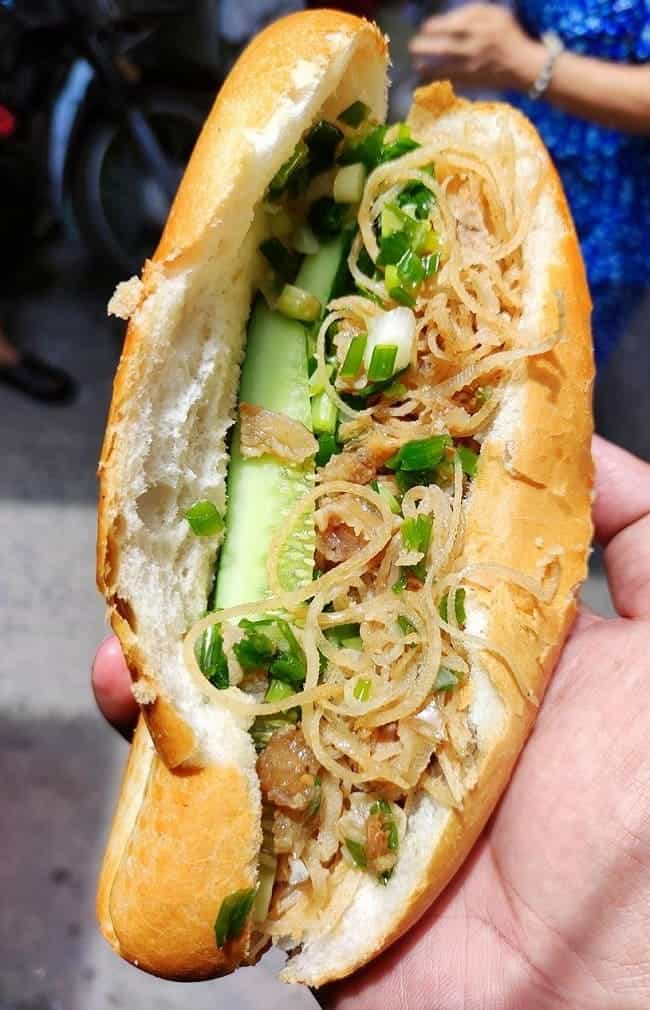
9. Bánh Mì Bò Nướng (Grilled Beef Banh Mi)
Juicy grilled beef (Bò Nướng)—whether in the form of meatballs or thinly sliced lemongrass-marinated beef—is cooked over high heat until smoky and fragrant, then tucked into a crusty baguette with Đồ Chua, chili, and fresh herbs.
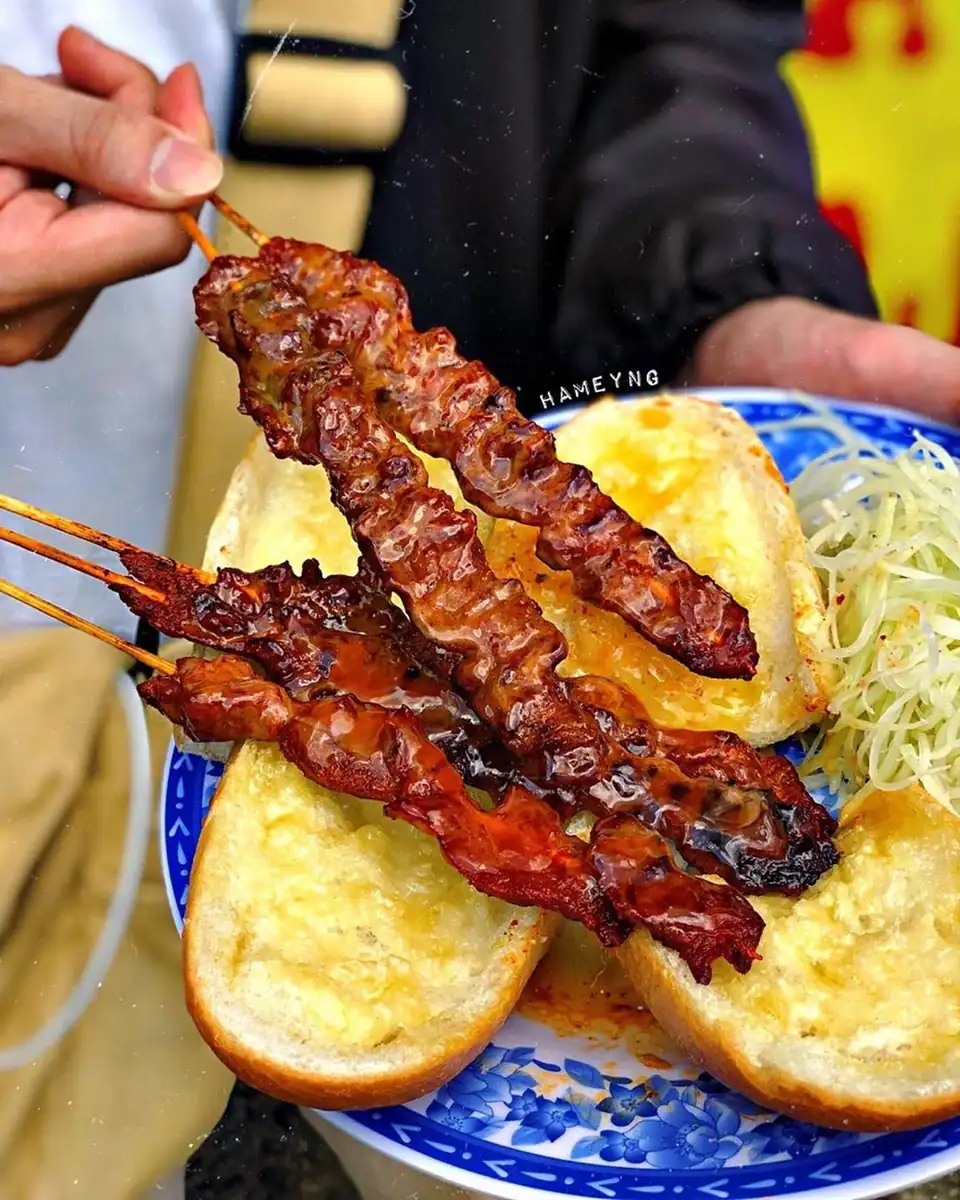
Beef Banh Mi is actually more popular outside Vietnam. Back home, beef is considered a pricier ingredient, so you won’t often find it in everyday Bánh Mì stalls—it’s more of a special treat than a street corner classic.
10. Bánh Mì Thịt Xíu (Five-Spice Pork Banh Mi)
Thịt Xíu (or Xá Xíu) is Central Vietnam’s take on the famous Char Siu. You’ll find it often in Huế and Hội An—where it also stars in the beloved Cao Lau noodles.
The pork shoulder is slowly braised in a fragrant five-spice sauce until tender, juicy, and beautifully glazed.

11. Bánh Mì Cá Mòi (Sardine Banh Mi)
This one’s a bit nostalgic. Cá Mòi Hộp—canned sardines in tomato sauce—is gently cooked down with shallots, onions, and a splash of fish sauce, then tucked into a warm baguette with cucumber and pickles.
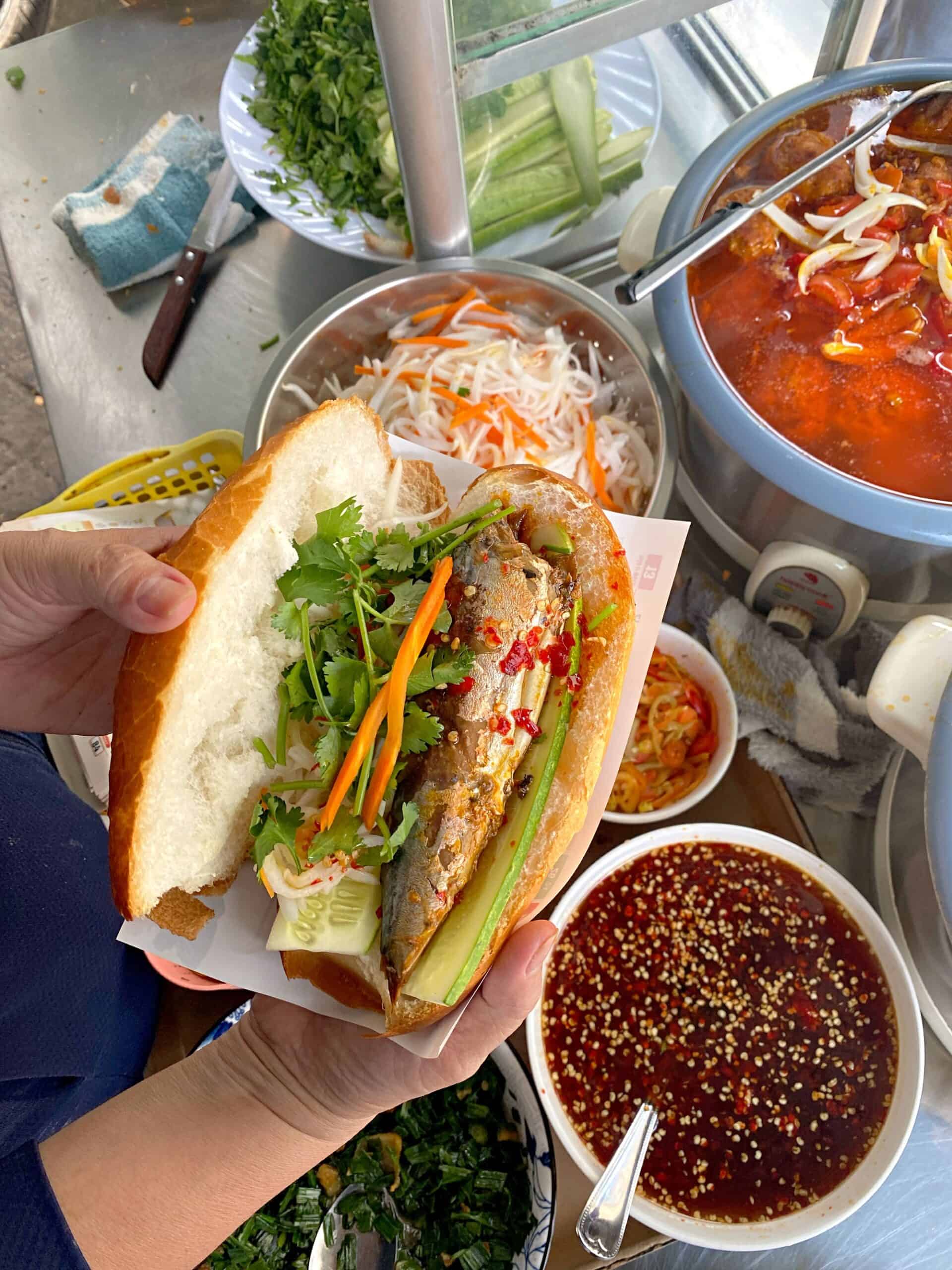
12. Bánh Mì Chả Cá (Fish Cake Banh Mi)
Fish Cake Banh Mi is popular in coastal cities like Nha Trang and Vũng Tàu.
Golden-fried fish cakes, slightly bouncy and fragrant, tucked into a baguette with pickled veggies, herbs, and a drizzle of sweet-tangy fish sauce.
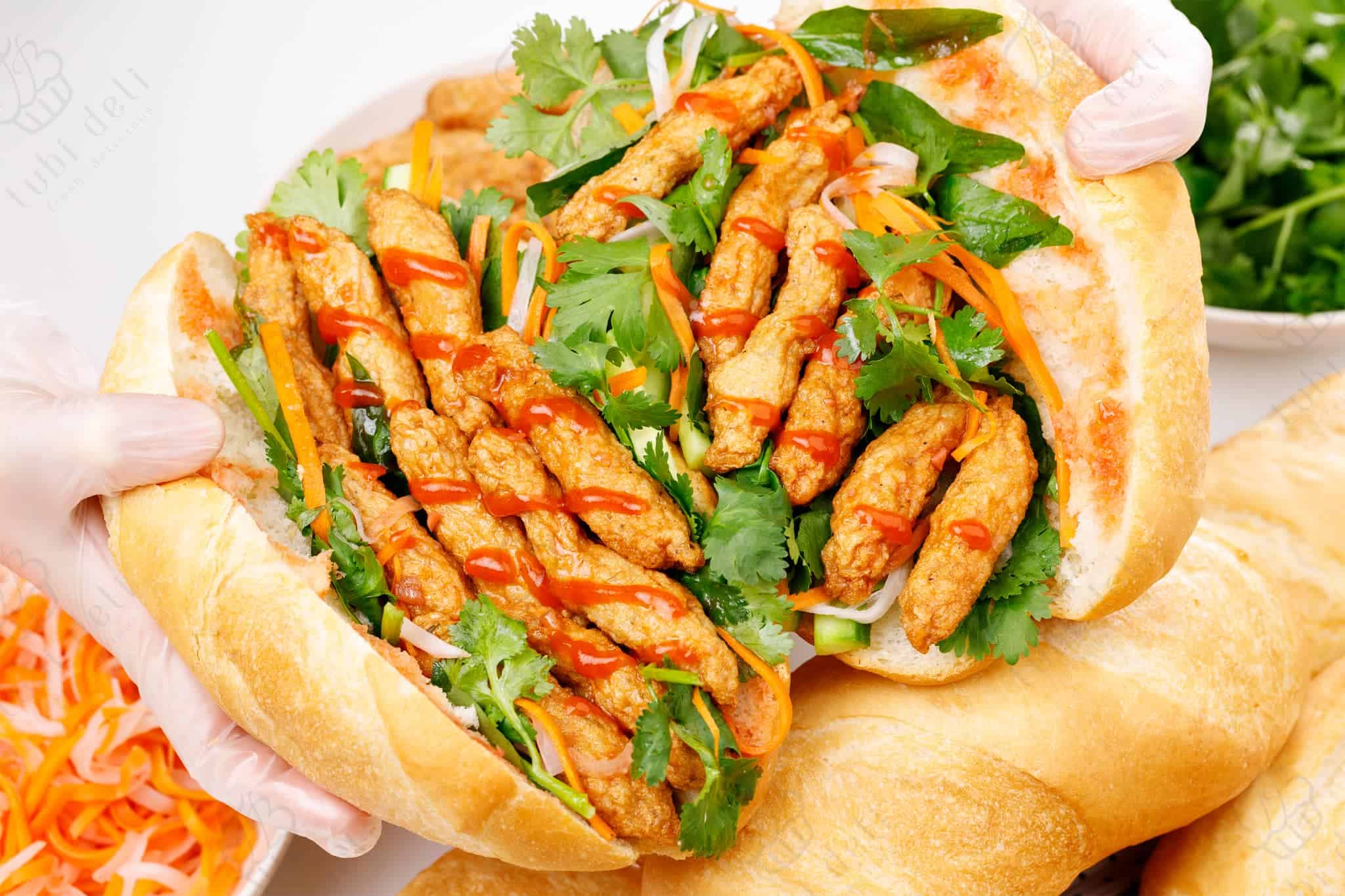
13. Bánh Mì Dân Tổ (Racing Boy Banh Mi)
Yeah, you heard that right. This Bánh Mì was originally made for Hanoi’s midnight crowd — the youngsters who stayed up late hanging out or the infamous “racing boys” (Dân Tổ as we call them).
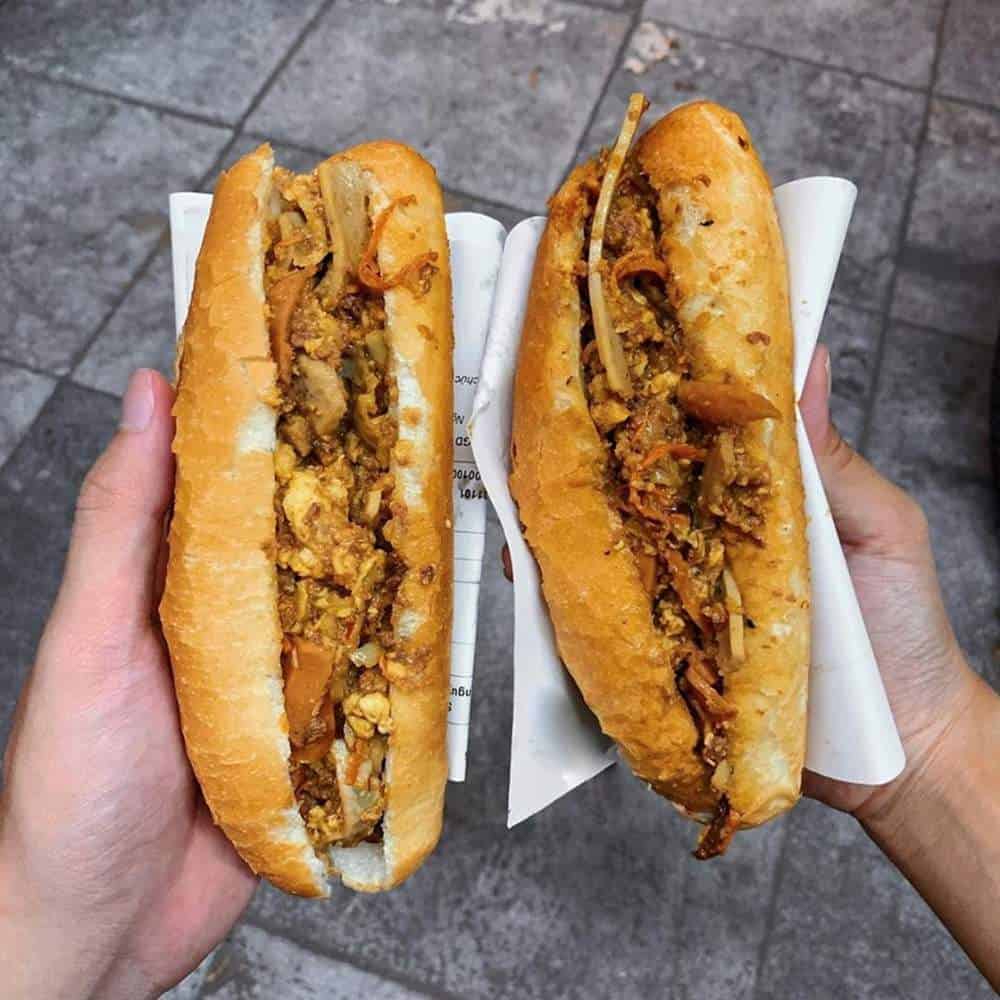
It’s a wild mix of stir-fried sausage, egg, Vietnamese beef jerky, and a good spoon of liver pâté — sounds chaotic, right? But somehow, it just works.
The flavor’s rich, messy, and addictive. What started as a late-night fix for the Dân Tổ has now become everyone’s guilty pleasure.
14. Bánh Mì Chay (Vegetarian Banh Mi)
I would say Vietnam is also a heaven for vegetarian and vegans since we have a long time history with buddhism.
All most Vietnamese foods would have their vegan version like vegan Bun Bo Hue, vegan Pho, vegan egg rolls so does the Bánh Mì.
Bánh Mì Chay is often stuffed with lemongrass tofu, seiten, TVP, vegan liver pâté made from beans and tofu. It’s super good even if you are non vegetarian, you would also love it if trying.
15. Bánh Mì and Beyond
Honestly, there are endless ways to enjoy Bánh Mì.
In Vietnam or abroad, people keep getting creative — think pulled pork Bánh Mì, gochujang chicken Bánh Mì, or even teriyaki chicken Bánh Mì. There’s no strict rule — just play around and find what fits your flavor.
And Vietnamese aunties? They never waste a thing.
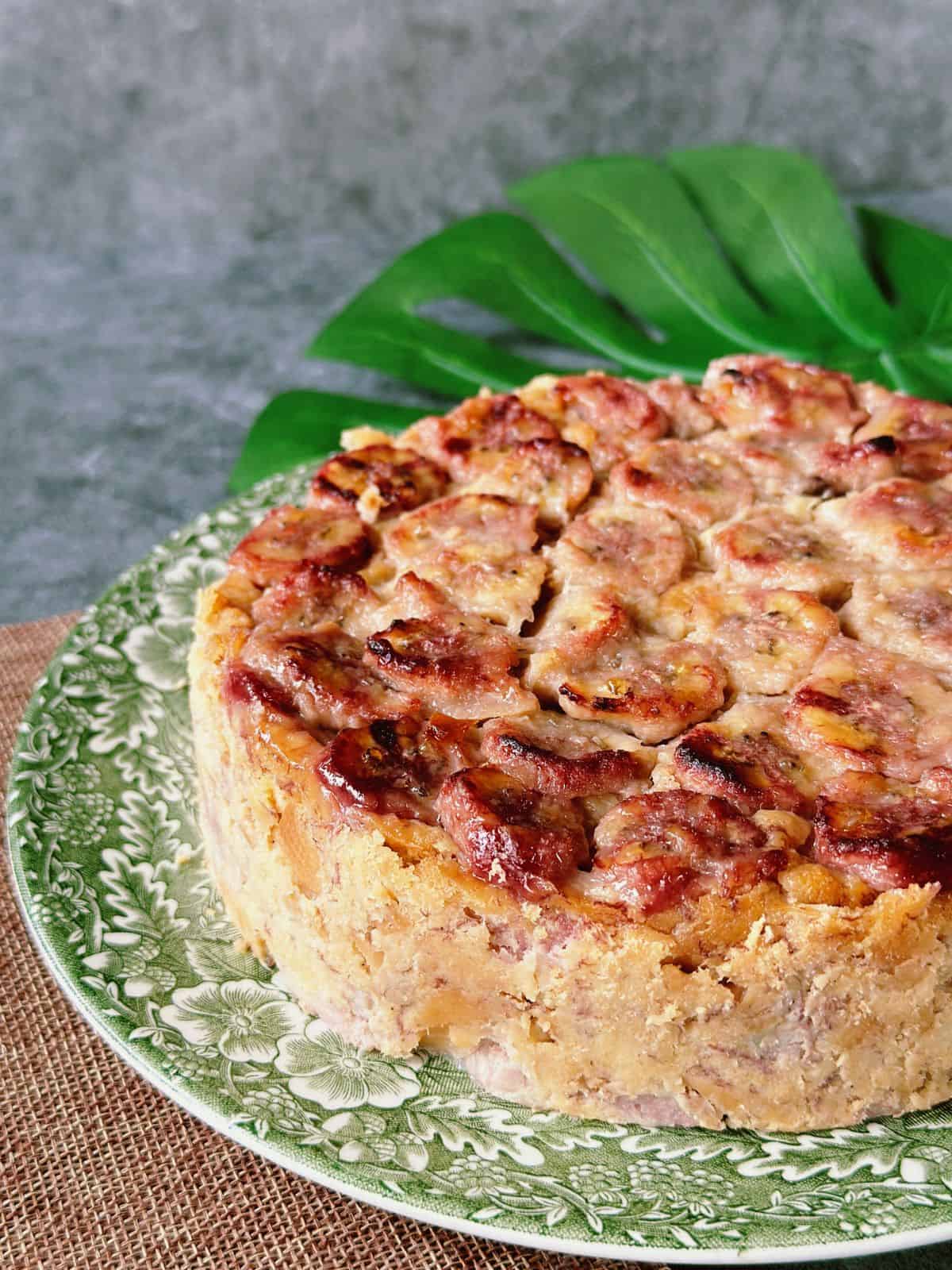
Stale Bánh Mì often gets a second life — turned into Banh Chuoi Nuong (Vietnamese bread pudding) or Banh Mi Hap (steamed Bánh Mì topped with stir-fried pork and jicama).
That’s what I love about Vietnamese cooking — nothing ever goes to waste, and everything somehow ends up delicious.
Dive Deeper into Vietnam’s Rich Food Culture
Vietnamese Herbs: The Ultimate Guide and How to Cook with Them
Vietnamese Vegetables: A Simple Guide to Using Them in Your Cooking
Vietnamese Fruits: Must-Try Picks and How Locals Enjoy Them
Vietnamese Coffee Brands: Top Picks to Try When You Visit Vietnam
Vietnamese Chocolate: The Delicious Hidden Gem You Should Know
Nuoc Cham vs. Nuoc Mam: Decoding Vietnam’s Iconic Fish Sauces
Northern Pho vs. Southern Pho: Understanding Vietnam’s Regional Twist on the Classic Soup
French – Vietnamese dishes: Not only Banh Mi — the French colonization also brought Vietnam many dishes like Pate Chaud (meat pie), Ga Ro Ti (coconut chicken) and Sua Chua (Vietnamese-style yogurt).
